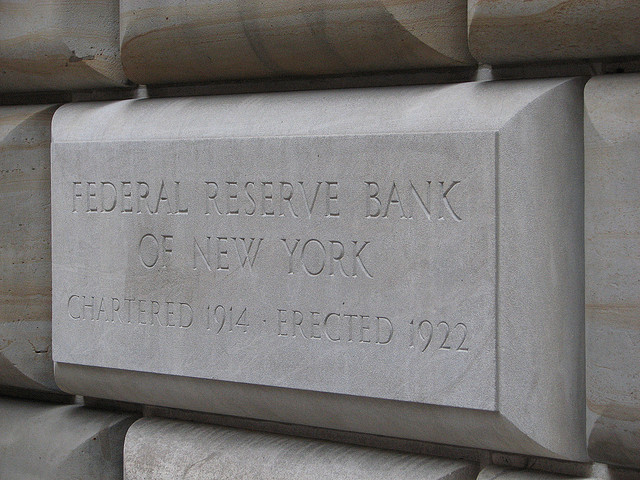by David Merkel, Aleph Blog
I am mystified at why people might be outraged or surprised that the Federal Reserve does a poor job of overseeing banks. The Fed is an overstaffed bureaucracy. Overstaffed bureaucracies always tend toward consensus and non-confrontation.
I know this from my days of working as an actuary inside an overstaffed life insurance company, and applying for work in other such companies. I did not fit the paradigm, because I had strong views of right and wrong, and strong views on how to run a business well, which was more aggressive than the company that I worked for was generally willing to do. Note that only one such company was willing to hire me, and I nearly got fired a couple of times for proposing ideas that were non-consensus.
This shouldn’t be too surprising, given the past behavior of the Fed. In 2006, the Fed made a few theoretical noises about residential real estate loan quality, but took no action that would make the lesser regulators do anything. It’s not as if they didn’t have the power to do it. One of the great canards of financial reform is that regulators did not have enough power to stop the bad lending. They most certainly did have enough power; they just didn’t use it because it is political suicide to oppose a boom. (Slide deck here.)
As a result, I would not have enacted Dodd-Frank, because I like my laws simple. Instead, I would have fired enough of the regulators to make a point that they did not do their jobs. How many financial regulators were fired in 2008-2009? Do you hear the crickets? This is the #1 reason why you should assume that it is business as usual in banking regulation.
You won’t get assiduous regulation unless regulators are dismissed for undue leniency. I have heard many say in this recent episode with Goldman Sachs, the New York Fed, and Carmen Segarra that those working for the Fed are bright and hard-working. I’ll give them the benefit of the doubt; my own dealings with those that work for the Fed is that most of them, aside from bosses, are quiet, so you can’t tell.
Being quiet, and favoring the powerful, whether it is bosses, politicians, or big companies that you regulate is the optimal strategy for advancement at the Fed over the last 30 years. It doesn’t matter much how bright you are, or how hard you work, if it doesn’t have much impact on the organization’s actions.
I try to be an optimistic kind of guy, but I don’t see how this situation can be changed without firing a lot of people, including most of the most powerful people at the Fed, lesser banking regulators, and US Treasury.
And if we did change things, would we like it? Credit would be less available. I think that would be an exceptionally good thing, but most of our politicians are wedded to the idea that increasing the availability of credit is an unmitigated good. They think that because they don’t get tagged for the errors. They take credit for the bull market in credit, and blame everyone except themselves and voters for the inevitable bear market.
Also, if we did fire so many people, where would we find our next crop of regulators? Personally, I would hand banking regulation back to the states, and end interstate branching, breaking up the banks in the process.
Remember, the insurance industry, regulated by the states, is much better regulated than the banking industry. State regulators are much less willing to be innovative, and far more willing to say no. State regulation is simple/dumb regulation, which is typically good regulation.
But whether you agree with my policy prescription or not, you should be aware that things are unlikely to change in banking regulation, because it is not a failure of laws and regulations, but a failure of will, and we have the same sorts of people in place as were there prior to the financial crisis.
Postscript
I would commend the articles cited by Matt Levine of Bloomberg regarding this whole brouhaha:
A bit more on Carmen Segarra.
Apparently the place to discuss regulatory capture is on Medium. Here is Dan Davies:
Regulated institutions generally have better contacts and relationships with the top central bankers than their supervisors do. And for whatever reason, top central bankers never developed the necessary knee-jerk aggressive response to any attempts to make use of these relationships to affect the behaviour of supervisors.
So banks never need to listen to their line-level regulators because they can always get those regulators’ bosses’ bosses’ bosses to overrule them. Here is Felix Salmon, mostly agreeing. And here is Alexis Goldstein with a litany of Fed enabling of banks. Elsewhere, Martien Lubberink explains the transaction that got so much attention in the Fed tapes, in which Goldman agreed to hang on to some Santander Brasil stock for a year before delivering it to Qatar. He thinks it was pretty vanilla. And Adam Ozimek has a good point:This American Life ep should lower avg est corruption belief. Goldman and NY Fed secretly taped & all u get is in non-confrontational nerds?
Copyright © Aleph Blog
Photo Credit: Michael Daddino















